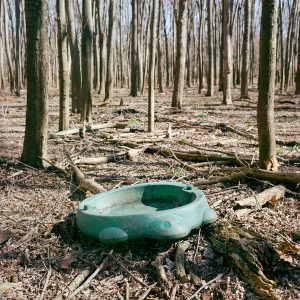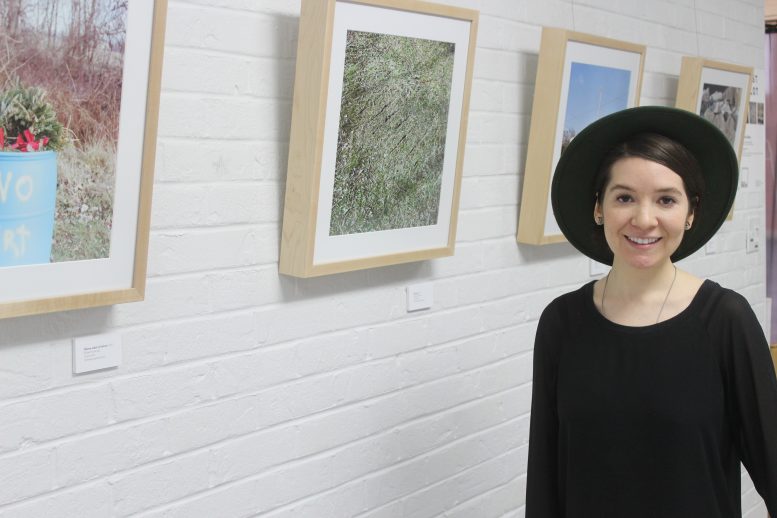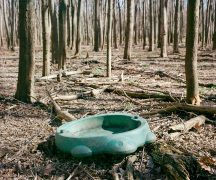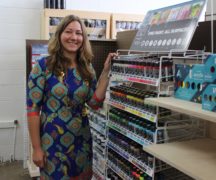By DAVID DUPONT
BG Independent News
Photographer Bianca Garza knows in her gut that something is wrong in humanity’s relationship to their environment. She suffers from the effects.
Growing up, she consumed processed and artificial food. She drank pop instead of water. Then with the encouragement of her boyfriend, Aaron Pickens, and his family, Garza started eating a “practical paleo” diet, based on foods grown sustainably. She ate traditional foods like those people ate before chronic diseases began taking their toll.
Now, Garza said, she was “hiking and biking.” That is until gum surgery in 2016 threw her back, and triggered chronic fatigue syndrome.
During that time of convalescence she looked at some of the photographs she’d been taking, and she saw they coalesced around a theme. Garza had captured odd juxtapositions between the natural world and artificial representations of the natural world.

“Her” by Bianca Garza (provided)
That breakdown, Garza believes, was manifesting itself in her own health issues. She’d worked briefly for Don Schooner at Schooner Farms, and that enhanced her appreciation for sustainable and regenerative agriculture – the belief that healthy soil produces the nutritious foods needed to nourish a healthy body. And depleted soil depletes our health. People become like the wheat stock in one of her photos, “Unyielding,” trying to break its way through cracked and dry ground.
“I really believe many of our health issues come from replacing what we’re supposed to get from the earth with something artificial that no longer holds that energy.”
A photo of abandoned truck trailer parked in an abandoned lot with a cornucopia decorating it cut to the core of the problem. “We have a lot of food stuff but we don’t have food with a lot of nutrition, and that’s what matters.”
That image, “Abundantly Clear,” is one of a baker’s dozen photographs now on display at Art Supply Depo, 435 East Wooster, Bowling Green. The exhibit remains up until March 25. A reception with the artist will be held Saturday, March 24, from 5-7 p.m.
The 2012 graduate of Bowling Green State University with a bachelor’s degree in visual communication technology with a specialization in photography, had not taken any photographs until she arrived on campus.
Her intent was to major in popular culture and become a writer. But she took an intro to photography course with Jeff Hall, and he spotted a talent, and encouraged her. Craig Bell and Brad Phalin, the photographers in the BGSU Office of Marketing and Communications, also recognized that, and hired her the next semester. She continues to work as a contractor for the office, as well as a freelance photographer.
She had the eye, they told her. The technical parts she could learn.
“I realized I was much better at visual storytelling,” she said. Garza does take a lot of time on her titles which resonate with the images. “Since my commercial work has to be so literal,” she said, “in my personal work, I like things to be abstract and quiet.”
Garza works with a medium format film camera. She takes the film to Main Street Photo to be developed and scanned into a digital file, which she can then print.
As soon as she was able she went on gentle walks carrying the bulky camera. These sometimes yielded images, most often did not.
Garza said she enjoys this work because unlike her commercial work it is not arranged and controlled. “When I go out in the world I never know what I’ll come across,” she said. Often nothing, or the rare treasure.
In the woods, she came across an old turtle shaped sandbox, its cover gone. The turtle is a sacred symbol of the earth for indigenous people. Here was a plastic representation, vulnerable, exposed to the elements.
Garza doesn’t move anything, rather she takes great care in how it is framed.
In “No Dirt,” Christmas wreathes are stuffed into a trash barrel emblazoned with the title. It speaks to people’s “aversion to dirt but relying on it to live.” A blade of grass protrudes from a hole in the side “trying not to be suppressed.”
Garza contends that instead of “mass produced food” we need “food produced by the masses” that connects people to the soil.
After the final image in the show, she has placed a quotation from pioneering environmentalist Aldo Leopold about the loss of traditional farming practices. It reads: “Perhaps we now grieve because we are not sure, in our hearts, that we have gained by the exchange.”




